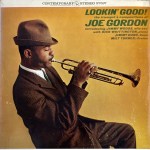
Hot Stamper Pressings of Contemporary Jazz Available Now
Reviews and Commentaries for Contemporary Jazz Albums
Recently we conducted a shootout for a superb Contemporary recording, one that we had auditioned a couple of times before and one which we felt we knew the music and the quality of the sound well.
It’s not the record you see pictured. For now we’re keeping the title a mystery, consistent with the idea that we give out lots of bad stampers on this blog, but almost never do we give out the good ones.
Why, you ask?
The cost of discovering the right stampers is usually high, can take decades, and is fundamental at the heart of how we make our money: by finding amazing sounding pressings with stampers we know to be good, cleaning them up, playing them, and offering those that, for whatever mysterious reasons that no one has yet to figure out, including us, have the best sounding grooves.
This time around we kept track of the stamper numbers for all the pressings we played, something we are making a habit of doing these days and using to highlight discoveries in the sound of the records we play.
In this case, we discovered an anomaly we thought we would bring to the audiophile world’s attention: the fact that the stampers for the best souding pressing were also the stampers for the worst sounding pressing, because they were the stampers for all the pressings.
One copy earned our White Hot Stamper grade, our highest, for its clearly superior sound, and another one earned our lowest Hot Stamper grade of 1.5+. The rest were quite good, in between those two, which is a very common outcome for most of our shootouts: lots of records in the middle of the distribution, some winners at the top and some losers at the bottom.
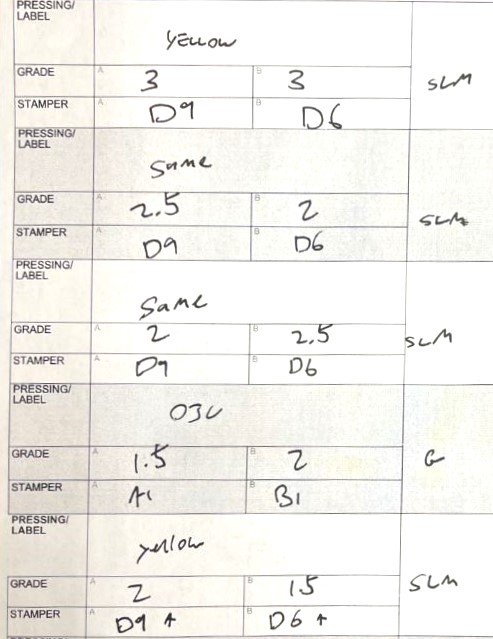
Note that the OJC of this title is one we have liked in the past. It didn’t do so well this time around, and that is mostly because we found out about some stampers we like even better. We will probably not being buying the OJC anymore; it’s probably more trouble than it’s worth.
However, the key takeaway from this stamper sheet is the fact that it beat one of the real Contemporary label pressings in the shootout.
So the question an audiophile record collector might ask himself is this one: is the OJC better or worse than the real Contemporary pressing with D9/D6 stampers?
The obvious answer is that it is better than some and worse than others.
But how would one arrive at that conclusion without a sufficiently large group of records to work with (not cheap), as well as the time to clean them (not insignificant), followed by the effort to play them in a rigorously controlled, blinded audition (not easy)?
The only comparison that might be doable — we can’t really call it a shootout — would be between one OJC pressing and one Contemporary pressing, and depending on the copies at hand, either one could win.
Once the winner has been declared, all that would be left to do is go up to the Hoffman forum and report your findings to help guide other like-minded audiophiles in finding the best sounding pressings, even though you really don’t know what pressing is better than what other pressing because you didn’t do your shootout right.
We do things differently here at Better Records, and I think I can safely say we get better results.


 Ansermet’s performance is clearly definitive to my ear as well. The gorgeous hall the Suisse Romande recorded in was possibly the best recording venue of its day, possibly of all time; more amazing sounding recordings were made there than any other hall we know of. There is a richness to the sound that exceeds all others, yet clarity and transparency are not sacrificed in the least. It’s as wide, deep and three-dimensional as any, which is of course all to the good, but what makes the sound of these recordings so special is the weight and power of the brass and the timbral accuracy of the instruments in every section.
Ansermet’s performance is clearly definitive to my ear as well. The gorgeous hall the Suisse Romande recorded in was possibly the best recording venue of its day, possibly of all time; more amazing sounding recordings were made there than any other hall we know of. There is a richness to the sound that exceeds all others, yet clarity and transparency are not sacrificed in the least. It’s as wide, deep and three-dimensional as any, which is of course all to the good, but what makes the sound of these recordings so special is the weight and power of the brass and the timbral accuracy of the instruments in every section.





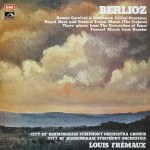
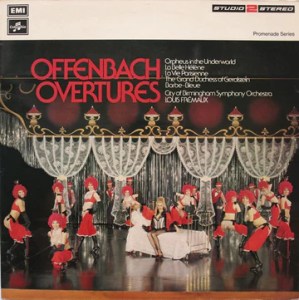
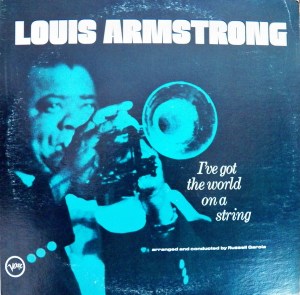
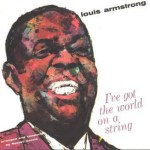 I have no idea what I would think of their version these days — well, to be honest I do actually have some idea of what I would think of it — but their version is at least good enough to make the case that Russell Garcia’s orchestral arrangements and Louis Armstrong’s sublime skills interpreting The Great American Songbook are a match made in heaven.
I have no idea what I would think of their version these days — well, to be honest I do actually have some idea of what I would think of it — but their version is at least good enough to make the case that Russell Garcia’s orchestral arrangements and Louis Armstrong’s sublime skills interpreting The Great American Songbook are a match made in heaven.